CDS year end newsletter (PDF)
File information
Title: CDS year end newsletter
Author: Gerald
This PDF 1.5 document has been generated by CorelDRAW X5 / Corel PDF Engine Version 15.2.0.686, and has been sent on pdf-archive.com on 27/12/2013 at 04:42, from IP address 1.125.x.x.
The current document download page has been viewed 624 times.
File size: 113.04 MB (13 pages).
Privacy: public file
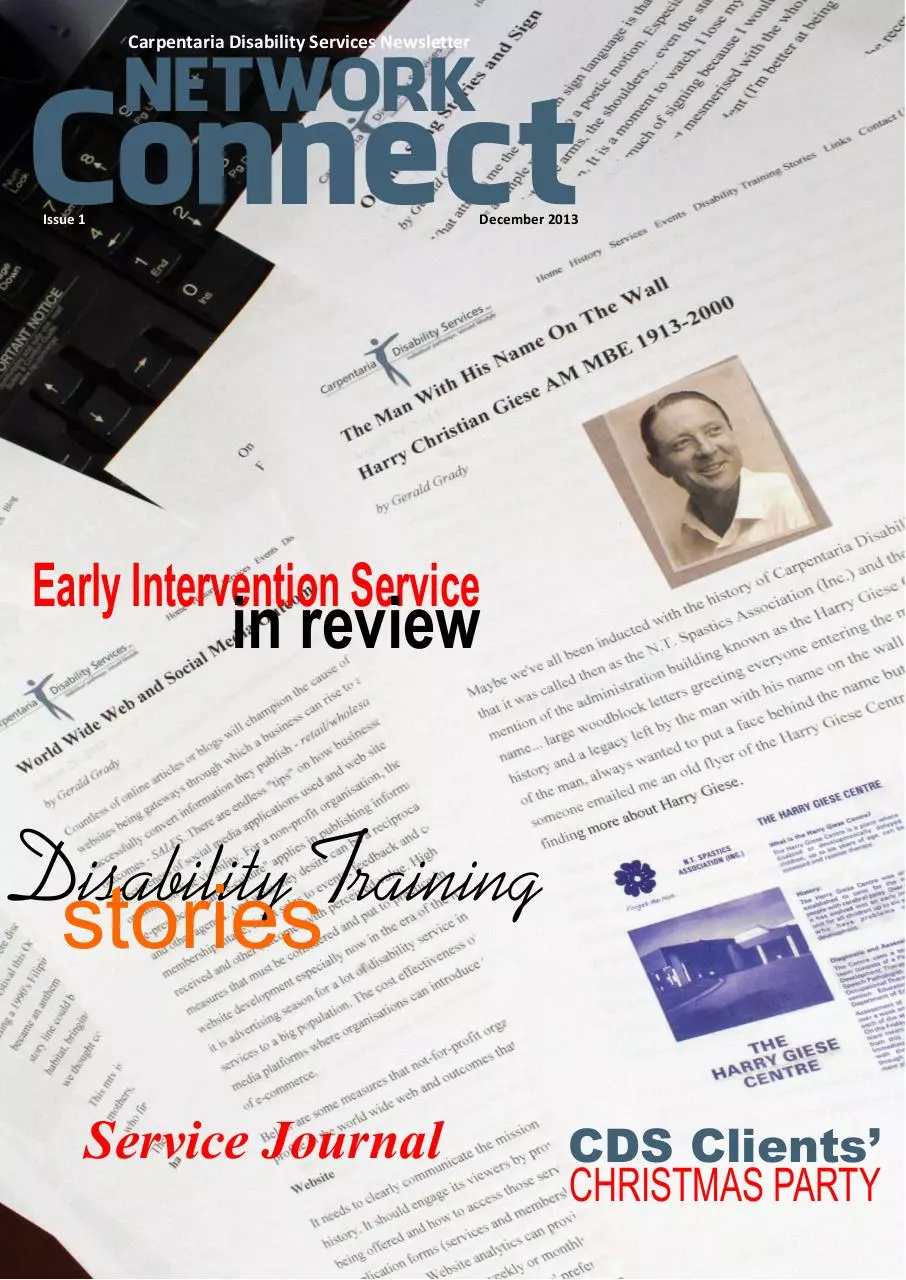
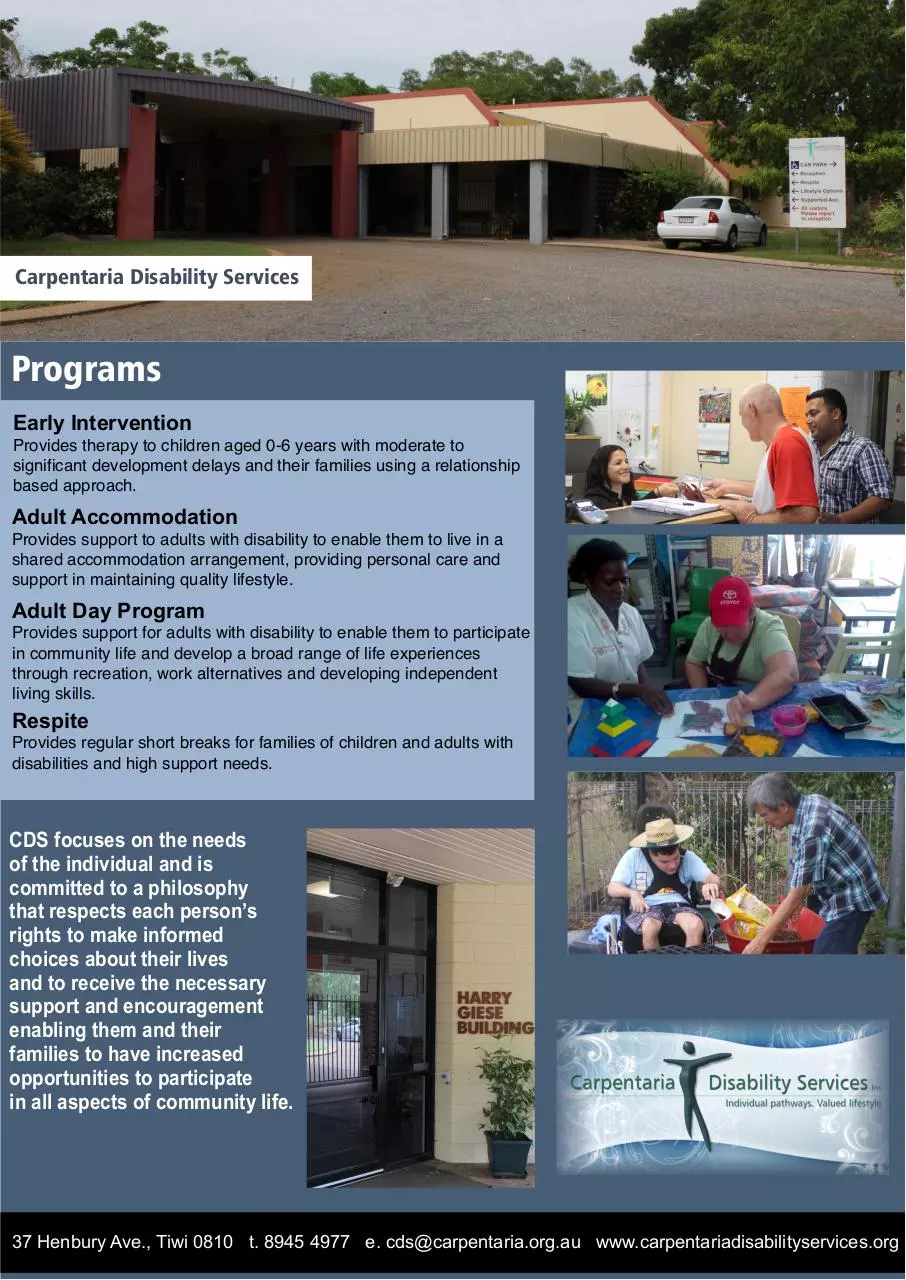
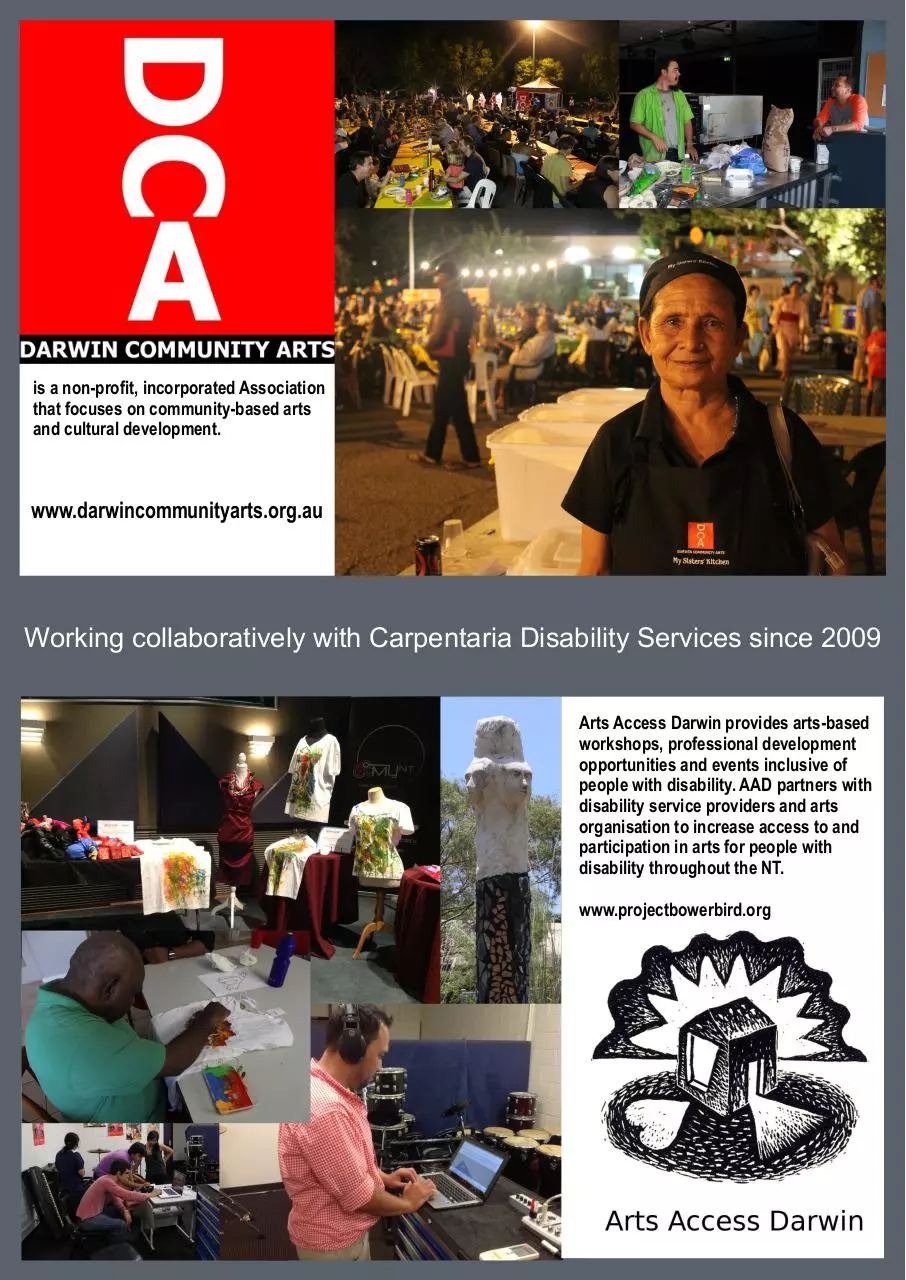

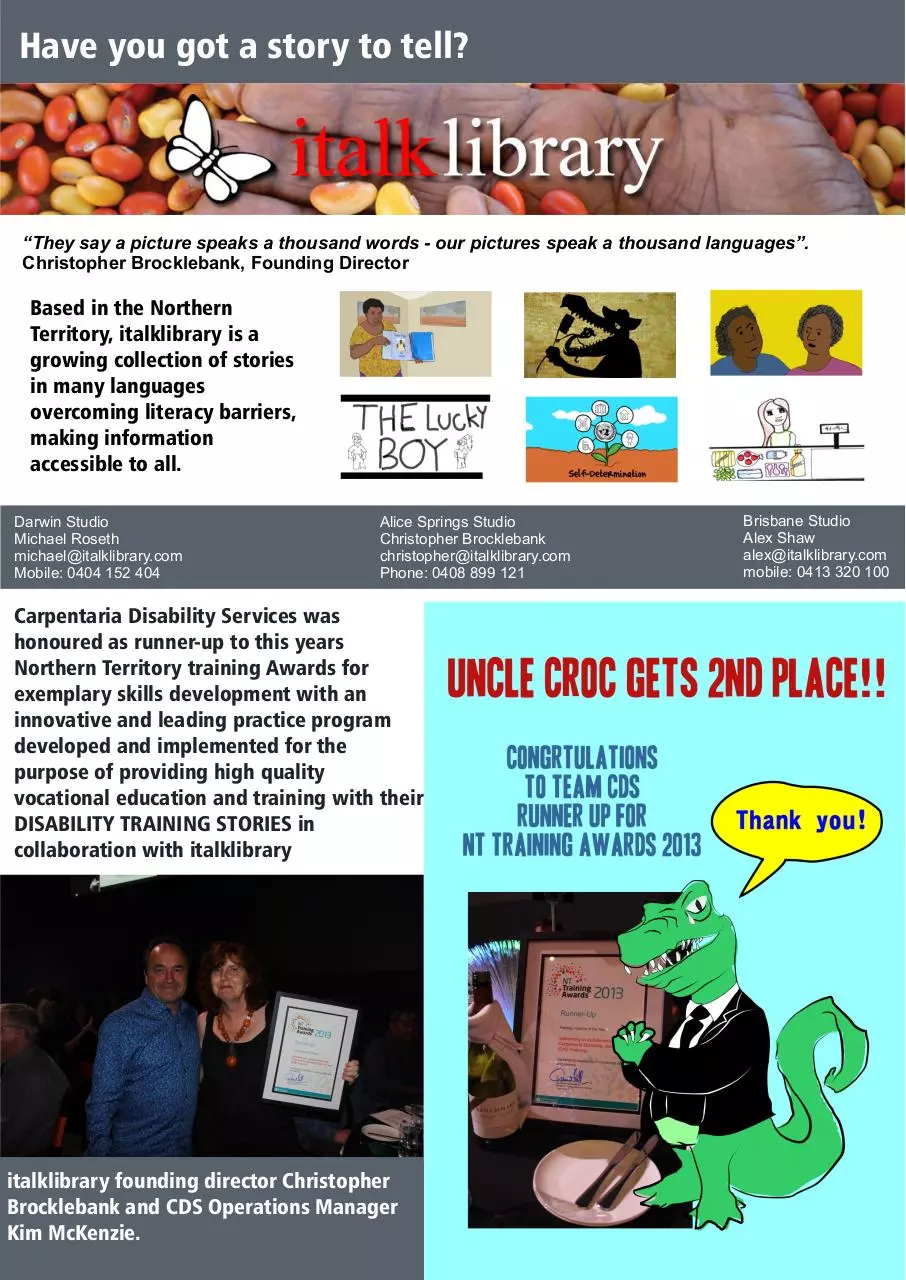
File preview
Carpentaria Disability Services Newsletter
NETWORK
Connect
Issue 1
December 2013
Early Intervention Service
in review
Dstories
isability Training
Service Journal
CDS Clients’
CHRISTMAS PARTY
Carpentaria Disability Services
Programs
Early Intervention
Provides therapy to children aged 0-6 years with moderate to
significant development delays and their families using a relationship
based approach.
Adult Accommodation
Provides support to adults with disability to enable them to live in a
shared accommodation arrangement, providing personal care and
support in maintaining quality lifestyle.
Adult Day Program
Provides support for adults with disability to enable them to participate
in community life and develop a broad range of life experiences
through recreation, work alternatives and developing independent
living skills.
Respite
Provides regular short breaks for families of children and adults with
disabilities and high support needs.
CDS focuses on the needs
of the individual and is
committed to a philosophy
that respects each person’s
rights to make informed
choices about their lives
and to receive the necessary
support and encouragement
enabling them and their
families to have increased
opportunities to participate
in all aspects of community life.
37 Henbury Ave., Tiwi 0810 t. 8945 4977 e. cds@carpentaria.org.au www.carpentariadisabilityservices.org
is a non-profit, incorporated Association
that focuses on community-based arts
and cultural development.
www.darwincommunityarts.org.au
Working collaboratively with Carpentaria Disability Services since 2009
Arts Access Darwin provides arts-based
workshops, professional development
opportunities and events inclusive of
people with disability. AAD partners with
disability service providers and arts
organisation to increase access to and
participation in arts for people with
disability throughout the NT.
www.projectbowerbird.org
NETWORK
Connect
Publisher
Carpentaria Disability Services Inc.
Enquiries
cds@carpentaria.org.au
Contributors
Kim McKenzie - kim.mckenzie@carpentaria.org.au
Jacqui Barfoot - jacqui.barfoot@carpentaria.org.au
Sarah Ryan - sarah.ryan@carpentaria.org.au
Photography, layout, graphics
Gerald Grady - gerald.grady@carpentaria.org.au
Website
www.carpentariadisabilityservices.org
www.linkedin.com/company/carpentaria-disability-services
December
5-6
Early Intervention Service - 2013 in review
7-8
CDS Clients’ Christmas Party Memories
10
Service Journal
11 - 12
Disability Training Stories
Pfrom the
We come to the end of another
year. And what a year it was!
It was a year full of challenges
and we held strong amidst the
changes and funding concerns
faced by our sector. And we turned the challenges into an
opportunity to strengthen our ties with services across the Top
End and provided a way to greater possibilities in service to
people. In this newsletter, we look back in 2013 and have another
glimpse on what we have accomplished as an organisation and
more importantly as a team collaborating and teaming up with
other community services and businesses in keeping a high level
of service delivery across service areas. A big THANK YOU to
everyone who has contributed to our achievements!
ublisher
We made an impact at the DisabilityCare Australia Conference in
Melbourne this year. Our Disability Stories project impressed
conference participants with its innovative concept in delivering
disability support and care training. Teaming up with italklibrary on
the project opened up immense possibilities in developing
multilingual training solutions through the use of current computer
technology. This partnership was honoured with a runner-up
award in the NT Training Awards 2013.
We continue to grow and strengthen our ties with Darwin
Community Arts through projects that has the potential to provide
programs and activities in media practice with shared multi-media
resources. We have began translating the Disability Stories into
other languages with DCA’s mobile recording equipment.
In August this year, CDS, Carers NT, Down Syndrome Association
of the Northern Territory and Human Services Advisory Council of
NT (HSTAC) facilitated a two day workshop in Combining PersonCentred Planning with Enterprising Education and Employment
Approaches in the NT that brought our sector together in
identifying key priorities in providing post school opportunities in
education and training, a more narrative, culturally engaging
education and training programs for people with disabilities, their
carers and support workers, and new opportunities in work
placement and enterprise ventures. Collaborative actions are
being developed to address these priority areas through potential
partnerships across the Top End.
To show we value the networks connecting clients, families,
guardians, funding providers, resources, staff and the wider
community, we have given our newsletter a new style and title
which shows networks are pathways that connect us through
social friendships, links, and community networks which in turn
are pathways that support us in providing our service to people.
This year, we have also stepped up our web and social media
presence to widen our communication coverage to various
sectors. Our website links us and our viewers to interstate articles,
modern ideas, service adverts and many other interesting and
valuable views.
To our readers, Network Connect is YOUR way to connect!’
THE COVER
The CDS website has a blog page
with articles from local, interstate
and international resources.
Have you got a story to tell?
“They say a picture speaks a thousand words - our pictures speak a thousand languages”.
Christopher Brocklebank, Founding Director
Based in the Northern
Territory, italklibrary is a
growing collection of stories
in many languages
overcoming literacy barriers,
making information
accessible to all.
Darwin Studio
Michael Roseth
michael@italklibrary.com
Mobile: 0404 152 404
Alice Springs Studio
Christopher Brocklebank
christopher@italklibrary.com
Phone: 0408 899 121
Carpentaria Disability Services was
honoured as runner-up to this years
Northern Territory training Awards for
exemplary skills development with an
innovative and leading practice program
developed and implemented for the
purpose of providing high quality
vocational education and training with their
DISABILITY TRAINING STORIES in
collaboration with italklibrary
italklibrary founding director Christopher
Brocklebank and CDS Operations Manager
Kim McKenzie.
Brisbane Studio
Alex Shaw
alex@italklibrary.com
mobile: 0413 320 100
Early Intervention Service
by
Jacqui Barfoot
2013 in review
A
s the year draws to an end, it is a good time to share
what has happened for EIS during 2013. While we
have had a busy year, continuing to respond to an increase in
referrals, we have also had a lot of highlights and implemented
some good changes to the way we work.
January brought the return of Genevieve Bradshaw to the
team. Genevieve completed her Bachelor of Psychology
(Honours) before starting with EIS and was working in the
Coordinator role.
In July she started her Masters and
transitioned to being a Provisional Psychologist on the team.
We are very pleased that she has decided to complete the
practical part of her training to become a Clinical Psychologist.
In May Gabrielle Kelly (Speech Pathologist), Andy Ewers
(Occupational Therapist) and Genevieve Bradshaw
organised for Maria Aarts to visit Darwin from Holland and
present two days of Marte Meo training to 90 participants.
Marte Meo is a method of educational counselling where
interactions between parents and children are videoed and
discussed with the therapist afterwards. A number of local
organisations made donations for the event to occur and this
enabled several people to receive a scholarship to attend.
Gabrielle, Andy and Genevieve received very positive
feedback from participants.
From June EIS started to offer group therapy options again. This included a toddler developmental group,
baby playgroup and several hydrotherapy groups. We endeavoured to receive feedback from parents about
their experiences of attending groups. This will help us work out what groups we will offer next year. So far the
feedback has been that while parents have enjoyed the social aspect groups create for their children, they still
prefer individual therapy sessions.
In July we sent out an evaluation form to all families who access our service. EIS really values parent feedback
as this informs the way we work. Thank you to all the families who completed this evaluation. We will provide
more detailed information about your feedback in the next EIS newsletter. We will also complete another
parent evaluation during 2014.
At the beginning of term 3, EIS implemented a new
therapy planning process. Each key therapist met
with parents at the start of the term. We heard about
what parents are hoping for their child and worked
together to make an individual therapy plan. This
helped determine the goals for sessions in term 3
and 4. Next year we will meet with parents again in
term 1 to make another plan for the next 6 months. In
addition, we will add a pre and post goal setting
measure to help us evaluate the outcomes of therapy
sessions at the end of term 2. This will give us more
information from parents about gains they have
observed and things that may still be difficult or a
priority.
Another change we made this year was that we
started to provide parents with a written summary at
the end of each session. We have heard from lots of
parents that this summary has helped them
remember specific things to do at home with their
child in between sessions.
In September Shay Jayawardena (Physiotherapist)
visited America and completed advanced training in
Neurodevelopmental Therapy. I received lots of
feedback from families about how much they missed
Shay while she was away! Shay reported this was an
excellent opportunity for expanding her knowledge
of this therapy approach and how to apply it to a
relational model of practice that EIS uses. We have
also enjoyed hearing about what she learnt.
John Callanan (Psychologist) has continued to work
on his PhD this year. John is researching how to
work effectively with parents who have a child with
additional needs. John frequently shares what he is
learning with the rest of the team. We are finding his
work in this area very valuable as it helps to inform
EIS practice.
In October John and I flew to Canberra to present at
the Australian and NZ Infant Mental Health
Conference. The title of our presentation was
“Making Life Bigger.” Firstly we talked about the
current research that informs our therapy
interventions. We then shared video of one family’s
sessions over time to demonstrate how we actively
involve parents in sessions to help them read their
child’s cues and respond in ways that facilitate
developmental gains. We would like to thank this
family for generously agreeing to be a part of our
presentation. The audience was very impressed
with how well this family supports their child’s
development!
Throughout the year Kim Whitburn (Senior Therapy
Assistant) has been visiting children who access EIS
at their child care centres. She has worked closely
with child care staff to provide suggestions about how
to support each child’s development in their child care
setting. Kim has recently enrolled in a Bachelor of
Social Work to further her knowledge in working with
children and families. We look forward to hearing
about what Kim learns along the way.
And lastly, 2013 has also been a full year for me.
While it is often a difficult experience for parents to
attend an early intervention service, I have valued
hearing from families and EIS team members about
the developmental gains children have made over the
past 12 months. This year I have continued to chip
away at my Graduate Diploma in Infant Mental Health
and am planning on finishing this next year. It will be
good to get my weekends back! I have also been
awarded a Churchill Fellowship to research evidence
based, parent-child interaction therapies for children
with significant developmental difficulties. Towards
the end of November I will head off to visit centres in
the UK, USA, NZ, Holland and Israel to investigate
their therapy approaches. I get back to Darwin in
February and am excited about sharing what I learn
with parents and CDS. I am very pleased to have this
opportunity as well as the chance to wear a winter
wardrobe! I wish you all a safe and restful break over
the Christmas period. See you in 2014!
BENDIGO NIGHTCLIFF COMMUNITY BANK
CELEBRATES WITH CDS EARLY
INTERVENTION
Bendigo Nightcliff Community Bank celebrate their
anniversary by giving back to the community. For
their Community Giving, each Board member
chooses a local organisation to support and
Lorraine Koch chose CDS Early Intervention as
recipient of her 2013 celebratory donation. On 14
October 2013, Lorraine together with fellow Board
Members Tracey Myles and Jim McDougall with
Branch Manager Jeff Watson presented a cheque
to EIS commending the service for its vital support
and services to families who have children with
disabilities.
Bendigo Nightcliff Community Bank celebrated
their 5th anniversary on 26 September 2013.
Happy Christmas
and a
Joyous New Year!
C
arpentaria Disability Services Inc. attended the
DisabilityCare Australia Conference in Melbourne on 23-24
June 2013. Headed by CEO Greg McMahon, Team CDS
made an impact to more than a thousand participants from different
disability services nationwide with their Disability Training Stories, a
Practical Design Fund project developed to help Indigenous people
complete the required Units of Competency to obtain the Australian
Certificate III in Disability. People grouped by the CDS display booth
and were offered a preview of the stories and videos created by
CDS in collaboration with italklibrary. This sparked enthusiastic
discussions among the conference participants and as Greg
McMahon puts it, "It’s about starting a conversation". And Team CDS
rose to the occasion not only by starting a conversation with the
people but, imparting a sense of hope and excitement with the many
possibilities of what the project could deliver and achieve in
mainstream service. It may well serve as a beacon in bringing the
community together: as Researcher and Community Facilitator
Robbie Lloyd says, "It is about coming together with an innovative
approach in aiming for better outcomes for people with disability."
CDS Operations Manager Kim McKenzie was brilliant with her
narrative during the dinner presentation of the Disability Training
Stories which enamored everyone at the hall. And not a few eyes
were left dry after watching one of the stories; Love In The Time Of
Dementia, a love story about a woman with dementia and being
cared for by her husband. Therein lies the strength of the project, as
we all learn visually and most effectively with stories. "Stories make
people cry and make them think, it makes people laugh and makes
them think," exclaims Christopher Brocklebank, italklibrary chief and
master story teller.
Damien Daby, CDS Adult Day Service Team Leader may well have
summed up the general feeling of the multitude, "It is exciting to be
here!" With the launch of the national disability insurance scheme
that heralds the advancement and many innovations coming to the
disability service, it is exciting to witness a new era in disability
support.
A
dult
ccommodation
by
Sarah Ryan
We’ve reached the end of another challenge filled year and we look forward
kicking-off 2014 with a new team of cluster coordinators that ensures a
continuous “client focused” service delivery. We have completed all annual and
quarterly review of our clients’ “person centred plan” that enabled us to cope with
their changing needs; review health goals and increase their community access.
We are proud to share some highlights in our service that shows our commitment
to care for and support our clients in improving their quality of life. I extend my
gratitude to all Supported Living staff that helped the service withstand the many
challenges we faced in 2013!
We have taken into our service two Aboriginal ladies who have transitioned from
long term hospital care to accommodation support. Their physical and emotional
well being continue to improve with support and care in their “newfound” home
life with CDS.
Our clients’ holiday schedules were successfully coordinated for them to visit various places in Australia and Bali. The
stories shared to us by our Aboriginal clients after visiting their country and connecting with family continue to help us in
shaping their individual plans. Our other clients enjoyed attending various concert events here in Darwin. Two of our clients
are fans of Kenny Rogers and they were overjoyed to have watched his concert in town.
Our clusters continue to host weekend barbecues. Thanks to the support staff that share their enthusiasm in promoting
friendships between clients and their families that enjoy this “get-together”.
I and three other staff members attended the MAYBO training hosted by CDS and was attended by participants from other
industries as well. Widely used in the UK and Australia, MAYBO trains the individual in Conflict Management and Physical
Intervention. We have been certified as trainers and I am excited to provide this training both in and outside of CDS in 2014.
On behalf of the Supported Living clients and staff, I wish everyone a Merry Christmas and a Happy New Year!
Service
Journal
Adult
Day
Service
A new volunteer programme has been
established at Crocodylus Park with the
clients helping prepare meals for the
park animals. This reinforces the
service’s commitment in social
inclusion, interaction and continuous
learning.
A programme that has received positive feedbacks from
clients and parents is the Gardening and Mosaics. This
programme supports individual choice and creativity in
artistic mosaic work in the garden.
Cricket and basketball have been added to the sports
activity. Basketball has proven to be popular and showing
the competitive side of our clients.
LSO clients also tapped into the music and dance
workshops with the Down Syndrome Association of the
Northern Territory. View pictures at:
www.joomag.com/magazine/lifestyle-options-volume-1-issue-2
One of our client was chosen to participate with a film
project for the Disability Training Stories and played the
lead character. View the short film at:
http://carpentariadisabilityservices.org/of-choice-andopportunity/
LSO and Supported Living joined in celebrating the clients’
Christmas Party at Tracy Village Sport and Social Club.
View the photographs in the centre spread of this issue.
Respite
The Glencoe Crescent property which caters for adults
and remote respite clients underwent renovation to
improve the property’s condition. The scope of work
included replacement of floor coverings throughout,
stripping of wall paint and repainting inside the house,
installation of a new kitchen, full remedial works and
modifications to two bathrooms, upgrading electrical
switchboard, an extensive ground maintenance, tree
removal and associated stump grinding. The refurbishing
will make the property more conducive for respite service
to clients and staff alike.
The project were scoped by Territory Housing and CDS but
due to the NT Government budget cuts, it has slowed down
the renovation considerably with Territory Housing
contributing as their restricted Repair and Maintenance
programme budget would allow and CDS funding and
implementing a substantial proportion of the project. More
than half of the renovation schedule have been completed
at this time and works will continue in 2014.
An alternative dwelling has been provided for the respite
clients. This temporary accommodation was also
renovated recently.
L
et’s imagine that you want to become a disability
worker. But to get your qualifications, you need to
be able to read books in Yolgnu and answer
questions in Warlpiri. You’ll need to know the meaning of
words like:
And let’s imagine you live in Yikkala; you only speak
Yolgnu; you live in a camp on the beach with your
grandma; and you have an intellectual disability. Your life
has always been this way. One day some white fellas tell
you need respite care, so they put you in an aeroplane;
send you to Darwin; to sleep in a strange house with
people who can’t understand you; give you horrible food;
and then they entertain you with a visit to a crocodile park.
“Just what exactly are these aliens planning?”
jaka-jakarr-wapami (to walk twisting your foot, making
the sand squeek)
jaka (-jaka) - yirrarni (make a decision - but for some one
else)
I have seen lots of great disability workers in communities
who unfortunately shy away from attempting to formalise
their skills by gaining a certificate. They can do the job just not the training packages!
The Disability Stories are a vehicle to remove this barrier
in disability training. We love the way italklibrary
recognises that the traditional way of learning in
Aboriginal society is via stories. We want to promote
disability training, happening outside classrooms.
The National Disability Insurance Scheme will create
unique opportunities for Aboriginal people trained in
disability care to gain paid employment in their own
Communities. But please, can we do the training in an
appropriate way - in a way that actually creates a learning
conversation... what I can teach you and what you can
teach me...
You’ll also be told to do things in your training, that are
unheard of in your community and sometimes go against
your culture:
“If my Auntie says she does not want to walk; I can’t
negotiate with her. That is very rude”.
A story.
“Individual choice? My family show they care for
my
disabled sister by making all the decisions
for her”.
“Pads? How do I throw them away? We have no garbage
service here.”
Perhaps you can now see why, at this time, there are only
a handful of Aboriginal people from remote communities
who have training in Disability Care.
Aboriginal people transfer knowledge through stories. In
our project, we took ten Units of Competency that are
required to obtain an Australian certificate 3 in Disability
and we turned them into stories.
The stories are about life on a typical Indigenous
Community; they’re a bit like a soap opera. Some stories
are funny; some are sad. All were designed to be
entertaining so you can sit down in the evening when it’s
cool and watch it with your family through a laptop, a
tablet, or a mobile phone. The stories are available to
anyone at anytime via the internet at the open access
italklibrary.
Each story contains elements of learning that are
required to pass the Unit of Competency. There is a
Mapping Document accompanying each story that
highlights these elements. And not only just seeing the
story and have the knowledge but, our stories start many
conversations about important things like:
What you should consider when you give someone a
wash.
Working in a routine.
The right way to give medicine safely.
Listening to people.
You’ll also learn how to conduct oral hygiene on a 4 meter
croc... but that’s another story.
But what about language? In the Northern Territory today,
there are 27 different Aboriginal language groups, and
within each group, there will be many distinct dialects.
Training
disability
by
Kim
McKenzie
The disability workforce in Australia is very multicultural.
At Carpentaria Disability Services we have people from
23 different nationalities working on our staff. Many of
the staff came to Australia as refugees. We are using the
stories to assist in training our ESL (English as second
language) staff in developing key skills in Disability care
and support.
Stories
That’s where our project partners, italklibrary come in.
Each of our stories can be translated into any language
through the italklibrary application.
So what will our training system, our stories, change for
disabled people in remote Aboriginal communities? if
there are more Aboriginal peoople with training in
disability care, it means:
Ÿ More Aboriginal people with disabilities can stay living
on country with their families.
Ÿ There will be better outcomes for disabled people
living in remote communities.
Ÿ Aboriginal people can receive appropriate training and
mentoring so they can work in disability care.
When you work in disability services in the Northern
Territory, there are two things that break your heart. First,
there are Aboriginal people with disabilities who have
become “stuck” living in supported accommodation
services in town because their home communities do not
have services to care for them. Connection to family and
country are lifeblood for traditional Aboriginal people. It is
a sad fact that for some, they will never see the wetlands
or sit with family beside a fire, telling stories. The second
heartbreaker is receiving disabled people from remote
communities for respite care in town care services. It is
not unusual to welcome Anangu who just need a better
level of care. They have bed sores, chronic urinary tract
infections, toe nails that impede walking, infected teeth;
along with contractures and muscle wasting that sap
independence.
Damien Daby, a Senior Support Worker of Carpentaria
Disability Services did voice overs for the Disability
Training Stories.
Nam Aung, a CDS
support staff,
translates the
stories in Burmese.
“I have a personal commitment to ‘grassroots’
skills development.
T
he inspiration for the project came with my experience
from working in remote Indigenous communities and
seeing the mixed quality of care delivery to older and
disabled people. Some Care Centres are good however,
some deliver care that is at best sad, and at worst
dangerous and alarming. this is because many of the
staff have no training. I have a personal commitment to
‘grassroots’ skills development. There are Care Centres
that have been built in remote communities but there has
been limited commitment to training people - who are the
key link to ensuring good care outcomes.
My experience is that in remote communities, Aboriginal
people become overwhelmed at the idea of undertaking
training in disability care. This is because the Training
Packages require the candidate to have a strong literacy
in English and sit in a classroom. However, good
disability care comes from the worker attaining a number
of standard practical skills (eg. washing and feeding).
They also need to have personal qualities of kindness
and empathy, along with the ability to work in a team.
CDS staff translating the stories into other languages in
using Darwin Community Art’s Media Lab.
COMBINING PERSON-CENTRED PLANNING (PCP) WITH
ENTERPRISING EDUCATION AND EMPLOYMENT APPROACHES
IN THE N.T.
A Two Days Hands-on Interactive Workshop with
JOHN & CONNIE LYLE O’BRIEN
from Syracuse University NY, USA
1st & 2nd of August 2013 - Rydges Airport Hotel
Facilitated by
Carpentaria Disability Servics Inc., Carers NT, Down Syndrome Association of the Northern Territory Inc. and Human Services Advisory Council of NT (HSTAC)
Carpentaria Disability Services Inc. sponsored this event
at the Rydges Airport Hotel on Thurs-Fri 01-02 August
2013, featuring international PCP specialists John and
Connie Lyle O'Brien from the USA, and Australia's Prof
Patricia O'Brien, Head of the Centre for Disability Studies
at Sydney University.
Carpentaria Disability Services Inc and Carers NT have
been conducting a scoping exercise over the past six
months, to encourage a collaborative coalition of Top End
human service, education & training, and employment
support & development organisations, interested in
person-valuing and community-building approaches to
supporting people living with disability, their carers and
families.
Three priorities have arisen from this work so far:
(1) Improved Post-School opportunities in Education &
Training, and Employment pathways for 18-25 year old
young people living with intellectual disability, and strong
support for a post-school model - Prof Patricia O'Brien is a
world expert on Inclusive Education Programs (IEP) in
Tertiary Education settings, and she has established the
IEP Network across Australia, in which we hope Darwin can
soon join;
(2) More culturally engaging, narrative & visually presented
Education and Training programs, for people with
disabilities, their carers, and their support workers (who are
predominantly from Culturally and Linguistically Diverse
backgrounds);
(3) New opportunities to join workplaces that will support
people with disabilities, and chances to create Enterprises
run by people with disabilities, and by Carers, themselves,
including exploring a Shared Resource Centre and
Business Incubation Model.
We hope to use this Workshop to bring forward some
collaborative actions to address these priority areas,
through potential partnerships across the Top End, for
improved outcomes in urban, regional and remote
communities.
Providing support and services across
the Territory to families and people
with Down syndrome for over thirty years
Providing information, training and
resources to schools and teachers through
the Down Syndrome Schools Support
Program and the Computer Aided Learning
Program
Down Syndrome Association of the Northern Territory
Shop 16 Rapid Creek Business Centre, Trower Road, Rapid Creek NT
Tel.: 08 8985 6222 email: admin@downsyndroment.com.au
New initiatives in post school education, training and employment launched in 2013
©
shoes by
Project
A new approach to education, work
and social skills development
for young people who have
Down syndrome incorporating
Certificate 1 in Education
and Skills Development
Walking In My Shoes
Collection of recycled containers
from industrial, business and residential
and a host of
Visit the newest business
addresses across Darwin and the rural
interactive activities
area with main sorting hub located at
in Rapid Creek selling recycled
The Patch
and new shoes, bags and jewellery
including
Employment opportunities for adults and
on-the-job training and support
Dance 21
Music 21
Media 21
Social 21
wims
SOCIAL ENTERPRISE INITIATIVES
promoting training in the workplace and
pathways for future mainstream employment
A short film adaptation about
Units of Competency for the Australian Certificate 3 in Disability
CHCDIS302A Maintain an environment to empower people with disabilities
CHCICS303A Support individual health and emotional wellbeing
A Flying Wheelchair Production
Presented by
Carpentaria Disability Services Inc. in assocIiation with
Arts Access Darwin
Written, produced and directed by
Gerald Grady
view at
http://carpentariadisabilityservices.org/of-choice-and-opportunity/
Download CDS year end newsletter
CDS year end newsletter.pdf (PDF, 113.04 MB)
Download PDF
Share this file on social networks
Link to this page
Permanent link
Use the permanent link to the download page to share your document on Facebook, Twitter, LinkedIn, or directly with a contact by e-Mail, Messenger, Whatsapp, Line..
Short link
Use the short link to share your document on Twitter or by text message (SMS)
HTML Code
Copy the following HTML code to share your document on a Website or Blog
QR Code to this page
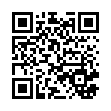
This file has been shared publicly by a user of PDF Archive.
Document ID: 0000139877.